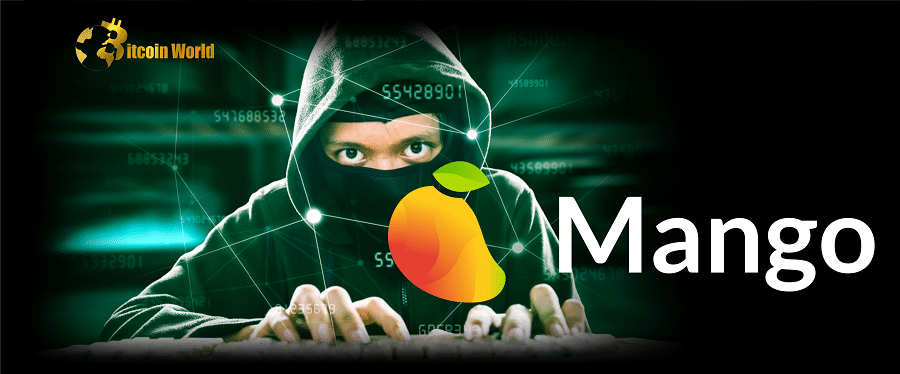The world of Decentralized Finance (DeFi) is often touted for its freedom and innovation, but recent events are casting a stark light on its vulnerabilities. Avraham Eisenberg, a crypto investor who boldly declared his “highly profitable trading strategy” was behind the $110 million drain from DeFi platform Mango Markets, has been arrested in Puerto Rico. This arrest, confirmed by court documents on Monday, could mark a significant turning point for DeFi regulation in the United States.
Who is Avraham Eisenberg and What Happened with Mango Markets?
Avraham Eisenberg, a self-proclaimed “game theorist,” became infamous in mid-October when he publicly admitted to his role in the Mango Markets incident. But what exactly did he do? Let’s break it down:
- The “Highly Profitable Trading Strategy”: Eisenberg essentially manipulated the price of Mango Markets’ native token, MNGO, perpetual futures contracts. These contracts are popular in the crypto world, similar to traditional futures but without an expiration date.
- The Manipulation Tactic: According to the complaint, Eisenberg executed massive trades, buying MNGO perpetual contracts from himself. This artificial buying pressure caused the price of these contracts to skyrocket by a staggering 1,300% in under an hour.
- The Exploit: With the inflated value of his position, Eisenberg then borrowed against it, effectively draining cryptocurrency deposits from the Mango Markets platform. The total sum he allegedly pocketed? A cool $110 million.
- Confession and Partial Return: Following the exploit, Eisenberg didn’t hide. He publicly acknowledged his actions, even calling it a “highly profitable trading strategy” on Twitter. He later negotiated with Mango Markets and agreed to return $67 million to the platform’s DAO (Decentralized Autonomous Organization), which intended to compensate affected users.
This sequence of events, from manipulation to confession and partial restitution, is now at the center of a landmark legal case.
Arrested and Charged: What are the Legal Implications?
Eisenberg’s arrest in Puerto Rico is no small matter. According to court filings made public on Tuesday, he is facing serious federal charges:
- Commodities Fraud: This charge alleges that Eisenberg defrauded Mango Markets through his manipulative trading activities.
- Commodities Manipulation: This charge specifically targets his actions of artificially inflating the price of MNGO futures contracts.
These charges, as outlined in an FBI Special Agent Brandon Racz deposition, carry significant penalties. Eisenberg could face substantial fines and even imprisonment if convicted.
The FBI deposition emphasizes that Eisenberg “willfully and knowingly” manipulated commodity sales, specifically futures contracts on Mango Markets. The legal documents state that his scheme involved “the intentional and artificial manipulation of the price of perpetual futures contracts…as well as other manipulative and deceptive devices and contrivances.”
Last week, I was part of a team that used a highly profitable trading strategy. @avi_eisenberg #MangoMarkets pic.twitter.com/g6R9QY2r8R
— Avraham Eisenberg (@avi_eisenberg) October 15, 2022
This arrest raises crucial questions about the regulatory landscape of DeFi and the accountability of individuals operating within it.
Why is This Case Important for DeFi?
Eisenberg’s case could set a precedent for how US authorities approach DeFi manipulation and fraud. Here’s why it matters:
- First Major US Case?: While the crypto world is no stranger to exploits and hacks, this case may be the first time a US resident faces criminal charges specifically for manipulating a DeFi platform. This signals a potential shift towards stricter enforcement in the DeFi space.
- Defining Manipulation in DeFi: The legal proceedings will likely delve into defining what constitutes manipulation within the decentralized and often less regulated environment of DeFi. This could lead to clearer guidelines and boundaries for future activities.
- Investor Protection: The case highlights the risks associated with DeFi platforms and the need for better investor protection mechanisms. It may prompt discussions about regulations that ensure fair markets and prevent similar exploits in the future.
- Platform Security: The Mango Markets incident underscores the importance of robust security measures for DeFi platforms. While decentralization offers benefits, it also presents unique security challenges that need to be addressed proactively.
Looking Ahead: What Does This Mean for the Future of DeFi?
The arrest of Avraham Eisenberg is a watershed moment for the DeFi sector. It serves as a stark reminder that even in the seemingly borderless world of decentralized finance, traditional legal frameworks are beginning to take hold. While DeFi promises innovation and accessibility, it also necessitates responsible participation and a clear understanding of the rules, both written and unwritten.
As this case unfolds, the crypto community and regulators alike will be watching closely. The outcome could significantly shape the future of DeFi regulation, enforcement, and ultimately, its mainstream adoption. Will this be the beginning of stricter oversight, or will it pave the way for more robust and secure decentralized financial systems? Only time will tell.
Disclaimer: The information provided is not trading advice, Bitcoinworld.co.in holds no liability for any investments made based on the information provided on this page. We strongly recommend independent research and/or consultation with a qualified professional before making any investment decisions.




